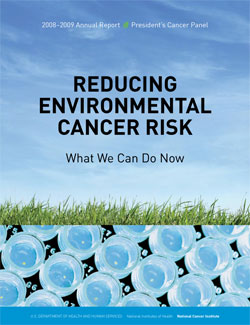
Today the President’s Cancer Panel issued a ground-breaking report to President Obama focusing on the role of the environment in cancer. The Panel, appointed by the President, is charged to give an annual update on the status of the National Cancer Program, also known as the “War on Cancer”.
This year’s report is a sea change on the “War on Cancer” not only because of the strong and wide-reaching recommendations that it makes, but it marks the first time the Panel has focused on the role of environmental chemical exposures in cancer in their nearly 40 year history. The report makes many critical statements about the current federal cancer research agenda which “has been limited by low priority and inadequate funding” in studying the role of chemicals in causing cancer, especially when those exposures occur during development. The report also chastises federal government agencies for “not fulfilling their responsibilities to protect public health” by performing the necessary regulatory functions to limit exposure to known or suspected carcinogens, such as asbestos, formaldehyde and trichloroethylene. The report also highlighted the need for reform of federal chemical policy and stronger regulation of chemicals by shifting the burden of proof from the government to the manufacturers with a focus on precaution and prevention. Sound familiar?
Many of the policy recommendations issued by the President’s Cancer Panel align with principles of the Safer Chemicals, Healthy Families coalition, of which NRDC is a founding member.
Some of the Panel’s recommendations include:
- stronger regulation of environmental contaminants with a shift in the burden of proof for chemical safety to chemical manufacturers,
- full disclosure knowledge about environmental cancer risks
- support for “green chemistry” and the development of safer chemicals,
- Special consideration for vulnerable populations — including fetuses, infants, children, workers and people living in toxic “hotspots” where high levels of contamination exist.
Last month, both the U.S. House and Senate unveiled legislation to overhaul the nation’s outdated chemical law, the Toxic Substances Control Act. That law has been widely criticized for preventing EPA from regulating even the small group of known human carcinogens, while also failing to keep pace with more recent science. Though the bills differ, each would require chemicals to be assessed for safety as a condition of remaining on the market. My colleague, Gina Solomon has recently posted a blog abou this newly introduced legislation and NRDC has a website where you can keep updated on the progress of this legislation.
In the meantime, the Panel has also outlined actions that inviduals can take to reduce their risk of cancer from environmental exposures. I’ve summarized some of them here but you can read their full recommendations starting on page xix of the report.
- Remove shoes before entering the home.
- Filter your home tap water over using bottled water
- Store and carry water in a stainless steel, glass or BPA-free container.
- Microwave food and beverages in ceramic or glass instead of plastic
- Eat organic produce and meats to reduce exposure to pesticides. Avoid consuming processed, charred or well-done meats.
- Reduce or stop using landscaping pesticides and fertilizers
- Check home radon levels.
- Become an active voice in your community by letting your policymakers know you support chemical policy reform.



